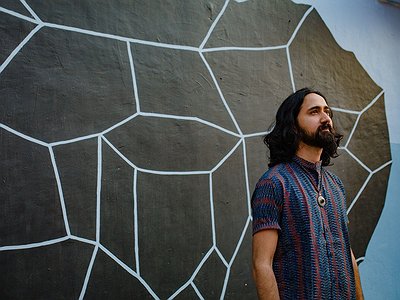Name: Sarathy Korwar
Nationality: US-born, Indian-raised, London-based
Occupation: Drummer, percussionist, composer, bandleader
Current release: Shruti Dances, a collaboration between Auntie Flo and Sarathy Korwar is out via ManMakeMusic.
If you enjoyed this interview with Sarathy Korwar, visit his official homepage for more information. He is also on Instagram, and Facebook.
When did you first start getting interested in musical improvisation?
I believe I started becoming interested in improvisation before I knew that there was a word associated with the process. As children, we all love to think and create spontaneously and our need for control is minimal. That's probably when I first started loving it!
Consciously, as an established musical concept, it was probably in my early 20s when I was on the lookout for alternate ways to music-making and came across the music of John Zorn, Derek Bailey etc.
Focusing on improvisation can be an incisive transition. Aside from musical considerations, there can also be personal motivations for looking for alternatives. Was this the case for you, and if so, in which way?
Yes, I think after having spent a few years in music institutions learning to play music I felt very restricted by what I was being told was creatively possible. I was at a point when I felt capable in my technical ability as a musician but I wasn’t feeling inspired by the kind of music I was being asked to get good at playing.
At this point, I was also becoming more aware of political, and social imbalances and I think the need to break some rules and questions pre-existing power structures played a huge role in how I fell in love with improvised music.
How would you describe the shift of moving towards an improvisation-based practise, both as a listener and a creator?
I think it is about giving up control. Giving up ego, giving up a constructed sense of individuality that one has built up over the years. One wants to try and feel a part of something much larger, interconnected across time and space.
What, would you say, are the key ideas behind your approach to improvisation? Do you see yourself as part of a tradition or historic lineage?
Yes, I do see myself as part of a tradition or historic lineage. Nothing that I can put a label or name on but all the musicians that I have played with, who have taught me to be present, listening, and curious.
I believe in the legacy of music and believe it is most powerful when seen as an ever-evolving form that takes on different guises in different places, time, and people.
How do you feel your sense of identity influences your collaborations? Do you feel as though you are able to express yourself more fully in solo mode or, conversely, through the interaction with other musicians? Are you “gaining” or “sacrificing” something in a collaboration?
I personally am far more comfortable making music with other people than I am with creating solo. I really enjoy making music with other people and love responding to sounds that I hear. Conversations really.
But I also do believe it is very important to learn what it is that I can do alone, and not fear the loneliness and vulnerability of solo work. It is something I am working on getting better at.
Nik Bärtsch reduced the art of musicianship to three principles: 1) Listen! 2) Only play the essentials 3) Make the others sound good. What's your take on this and how do these principles pan out in practise?
I think these principles apply to certain contexts but not all. Rules are meant to be broken, or tested at least! It’s good to have a few reminders that help focus you.
I believe the above ones from Bärtsch are good but I would also think about practice. Practice that is pre-meditated and not improvised, to make yourself a better improviser.
How do you see the relationship between sound, space, and performance, and what are some of your strategies and approaches to working with them?
All three factors should affect each other and an awareness of all three at any given point in time is crucial. It is when the body is alert to these and responds instinctively, is when true art is made!
I often think about breathing as a central focus of my improvisational process as well. For example, one essential practice for me and my band is to do group breathing exercises together before going on stage. I believe this helps focus us all in, spend intimate time together and gather our energy before letting our minds and bodies take over. Letting go!




